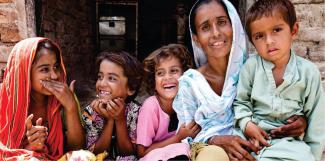The United States Agency for International Development (USAID) is partnering with the Government of Pakistan (GoP) at the federal and provincial levels to improve the lives of citizens of Sindh. These efforts support Pakistan’s journey to self-reliance—the ability of a country to plan, finance, and manage its own development.
HIGHLIGHT
In recent years, the Sindh Province has faced a variety of challenges including low literacy, low per capita income, violent extremism, malnutrition, high infant mortality, as well as natural disasters. USAID partnered with the Sindh government to improve the lives of citizens through better access to electricity, water, education and health services as well as governance, water & sanitation, economic growth & agriculture.
EDUCATION
With USAID support, the Government of Sindh pioneered a flagship public-private partnership program that contracts school administration to Education Management Organizations to expand service delivery in public schools. USAID also established partnerships with Pakistani and American universities to establish a Center for Advanced Studies that supported applied research and prepared the next generation of scholars.
HEALTH
USAID has contributed to improving infant and maternal mortality rates by improving the supply of, and demand for, health services in the Province. USAID constructed or renovated 73 maternal and child health centers across Sindh, along with ob-gyn and maternity wards at Jinnah Postgraduate Medical Center in Karachi and the Jacobabad Institute of Medical Sciences. USAID-funded health communication activities reached over 60 million families.
RESILIENCE
Water governance emerged as a major development challenge in Sindh, with ramifications on agriculture, health and municipal governance. In the city of Jacobabad, USAID is enabling the local government to provide reliable and sustainable clean drinking water by rehabilitating the city’s dilapidated water supply and sewerage systems. By completion of the project, over 300,000 citizens will have access to improved water supply.
ENERGY
One of Pakistan’s most crucial development challenges is its energy shortfall. Unplanned outages cost the country an estimated 2 percent of its GDP. Therefore, USAID programs helped rehabilitate the Guddu and Jamshoro power plants in Sindh by upgrading major equipment. These undertakings have added enough energy to the system to provide power to 3.5 million people (double the amount of people living in Hyderabad). To help Pakistan take advantage of its plentiful wind corridors, USAID funded the construction of a transmission line connecting private sector wind projects to the national grid, which has added enough energy to provide power for nearly another 2.6 million Pakistanis.
ECONOMIC GROWTH AND AGRICULTURE
USAID has helped farmers adopt better practices and technologies to improve their productivity and become more competitive. USAID supported the development of the livestock, vegetable, and horticulture sectors in Sindh with a focus on upgrading quality, promoting processing, and enhancing exports. In recent years, numerous enterprises and farmers adopted innovative technologies resulting in millions of dollars in private sector investment, sales revenues, and thousands of jobs.
HUMANITARIAN ASSISTANCE
In the aftermath of the devastating floods of 2010 and 2011, USAID played a significant role in humanitarian relief, reconstruction, and infrastructure development. Partnering with other international donors, USAID has set up eight Humanitarian Response Facilities around the country, including one in Sindh, to help alleviate the social and economic impact resulting from these, and other man-made disasters affecting the Province.
COVID-19 RESPONSE
In partnership with National Disaster Management Authority (NDMA), USAID delivered 52 ventilators to the Sindh Government to help manage critically ill patients. USAID also worked with the Sindh Lady Health Workers (LHW) program on institutionalizing home-based care (HBC) for mild COVID-19 patients in fifteen districts of Sindh. The U.S. government also delivered 2.5 million doses of Moderna vaccine to the Federal government, out of which the Sindh Government has been provided 400,000 doses, along with Personal Protective Equipment (PPE).

